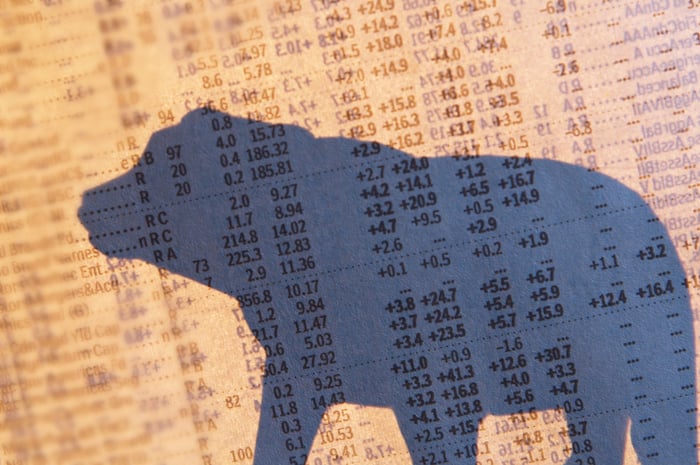Whether you're a relatively new investor or have been putting your money to work on Wall Street for decades, it's been a challenging environment.
Since hitting their all-time closing highs in early January, the nearly 126-year-old Dow Jones Industrial Average and widely followed S&P 500 have fallen by more than 10%. Things are even worse for the growth-focused Nasdaq Composite (^IXIC 0.78%), which has seen as much as 24% of its value wiped away since its November closing high. This greater than 20% decline firmly places the Nasdaq in a bear market.

Image source: Getty Images.
Although bear markets can be scary and turbulent, they're historically a great time to put your money to work. Even though we don't know how precisely how long this bear market will last or how steep the decline will be, history shows that all downturns are eventually erased by a bull market rally -- and that includes the Nasdaq.
As the market sell-off intensifies, the following three stocks stand out as no-brainer buys.
Berkshire Hathaway
Arguably one of the smartest buys investors can make with the stock market plunging is conglomerate Berkshire Hathaway (BRK.B 0.26%) (BRK.A -0.80%).
While Berkshire Hathaway isn't a household name, its CEO, billionaire Warren Buffett, is well-known. Since Buffett took over as CEO in 1965, he's averaged an annual return of 20.1% for shareholders (himself included). Through the end of last year, this worked out to a greater than 3,600,000% aggregate gain for the company's Class A shares (BRK.A). Though Buffett's company may not outperform every year, he has a track record that suggests riding his and his investment teams' coattails over long periods is a moneymaking strategy.
As I've previously pointed out, one of the core reasons Berkshire Hathaway is such a successful business is that most of its owned assets and investment portfolio are cyclical in nature. Cyclical businesses perform well when the U.S. and global economy are firing on all cylinders, and they can struggle when recessions arise. Instead of trying to time these recessions, the Oracle of Omaha has positioned Berkshire Hathaway to thrive during periods of economic expansion. Since these expansions last disproportionately longer than recessions, it's been a smart bet for Buffett and his shareholders.
Another reason for Berkshire Hathaway's success is the mountain of dividend income being generated each year. When I examined Berkshire's portfolio earlier this year, it was on pace to collect more than $5 billion in dividend income. With Buffett recently upping his company's stake in Chevron, this figure could be notably higher now. Sitting back and collecting boatloads of passive income helps bolster Berkshire's often cash-rich balance sheet.
Even if Berkshire Hathaway doesn't return 20.1% annually for shareholders going forward, it should still handily outpace bond returns and the S&P 500.

Image source: Getty Images.
York Water
If you want a no-brainer stock to buy during the Nasdaq bear market sell-off that's completely off the radar, consider small-cap water utility York Water (YORW 0.51%).
Chances are that you and your fellow investors have never heard of York Water -- and that's to be expected. This is a water and wastewater utility provider in South-Central Pennsylvania that serves just three counties and 51 municipalities.
But York has done something that no other publicly traded company has done: it's paid a consecutive dividend in each of the past 206 years. To York's knowledge, no other public company has paid a consecutive dividend for a longer period. In fact, the next-closest company I found was Stanley Black & Decker, which trails York's consecutive payout streak by 60 years!
What makes York Water such an income stud is the predictability of its operating model. First off, it's a regulated utility. This is a fancy way of saying that it can't pass along price hikes to its water and wastewater customers without getting approval from the Pennsylvania Public Utility Commission. While this might sound burdensome, it ensures that York isn't exposed to pricing fluctuations.
Furthermore, water usage doesn't change much from year to year. If the stock market performs poorly for a few months, water usage in South-Central Pennsylvania isn't going to suddenly decline. This cash flow predictability is what allows York Water to outlay capital for new infrastructure projects and acquisitions without adversely impacting its dividend or profitability.
Given the lack of question marks surrounding York's operating model, any big dip should be viewed as a buying opportunity.

Image source: Getty Images.
Bristol Myers Squibb
A third no-brainer stock to buy during the Nasdaq bear market decline is pharmaceutical company Bristol Myers Squibb (BMY 0.91%).
The great thing about healthcare stocks is they're highly defensive. What I mean by this is that no matter how well or poorly the U.S. economy and stock market are performing, it doesn't change the fact that people will continue to get sick and require care. The vast majority of companies that provide prescription drugs, medical devices, and healthcare services are unlikely to see a drop-off in sales just because Wall Street has hit a rough patch.
One of the top reasons for investors to be excited about Bristol Myers is the company's growing list of blockbuster therapies in the oncology and cardiovascular space. For instance, oral anticoagulant Eliquis, which was developed in cooperation with Pfizer, continues to generate double-digit year-on-year sales growth and is pacing nearly $13 billion in annual revenue, based on $3.21 billion in first-quarter sales.
Another key therapy with long legs is cancer immunotherapy Opdivo. Opdivo is being tested as a monotherapy and combination treatment in dozens of clinical trials. If just a handful of these studies prove successful, Opdivo can push north of $10 billion in annual sales.
Don't overlook multiple myeloma drug Revlimid, either. Even though Revlimid is facing the loss exclusivity in international markets, it's still capable of $11 billion in annual sales. In the U.S., Revlimid won't face an onslaught of generic competition until February 2026.
With a rich product pipeline, dividend yield of 2.9%, and forward-year price-to-earnings ratio below 10, Bristol Myers Squibb checks all the right boxes to be a no-brainer buy in a Nasdaq bear market.





